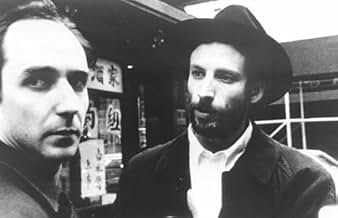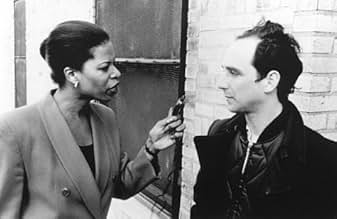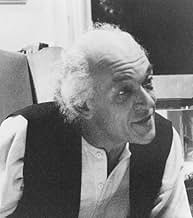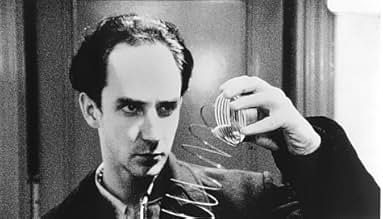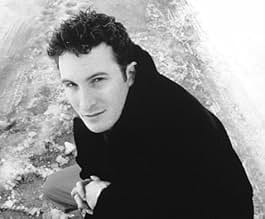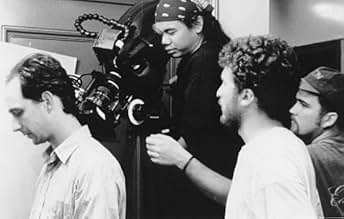Pi
- 1998
- Tous publics
- 1h 24m
A paranoid mathematician searches for a key number that will unlock the universal patterns found in nature.A paranoid mathematician searches for a key number that will unlock the universal patterns found in nature.A paranoid mathematician searches for a key number that will unlock the universal patterns found in nature.
- Awards
- 8 wins & 12 nominations total
Stanley B. Herman
- Moustacheless Man
- (as Stanley Herman)
Featured reviews
Now here'a film that is "not for all tastes," as the cliché goes.
"Strange" doesn't quite cover it but it is not that bizarre that you can't figure out what's happening. Director-writer Darren Arokofsky made a name for himself with his second movie, Requiem For A Dream, and this was the young filmmakers' first effort. It was made a tight budget since he was an unknown, but that's part of the attraction. This is grainy black-and-white, and so is the gritty story and most of the characters. The unique look fits the story.
It's not a story that is going to please a lot of people - an almost-demented math wizard trying to figure out stock market codes and two groups hounding him trying to cash in on his brainpower. One is trying to use him to make big money in the market and the other is trying to decipher ancient Jewish texts and thinks our mathematician can help. Meanwhile, he wants no part of any of these people.
Our hero, the numbers freak, thinks the entire world revolves around numbers. Everything in the universe, he thinks, can be figured out through number codes. Not only is he wacked and paranoid but so is about everyone in here. They all have strange ideas. Innovative camera-work makes the story even stranger. In fact, it's that photography that makes this DVD a part of my collection
If you're looking for something different here and there, I would give this curiosity piece a quick look. (It's not a long movie.) Overall, I thought this "added up" to an intriguing film, but if you give it a try and hate it, don't blame me.
"Strange" doesn't quite cover it but it is not that bizarre that you can't figure out what's happening. Director-writer Darren Arokofsky made a name for himself with his second movie, Requiem For A Dream, and this was the young filmmakers' first effort. It was made a tight budget since he was an unknown, but that's part of the attraction. This is grainy black-and-white, and so is the gritty story and most of the characters. The unique look fits the story.
It's not a story that is going to please a lot of people - an almost-demented math wizard trying to figure out stock market codes and two groups hounding him trying to cash in on his brainpower. One is trying to use him to make big money in the market and the other is trying to decipher ancient Jewish texts and thinks our mathematician can help. Meanwhile, he wants no part of any of these people.
Our hero, the numbers freak, thinks the entire world revolves around numbers. Everything in the universe, he thinks, can be figured out through number codes. Not only is he wacked and paranoid but so is about everyone in here. They all have strange ideas. Innovative camera-work makes the story even stranger. In fact, it's that photography that makes this DVD a part of my collection
If you're looking for something different here and there, I would give this curiosity piece a quick look. (It's not a long movie.) Overall, I thought this "added up" to an intriguing film, but if you give it a try and hate it, don't blame me.
I have yet to come even close to fully appreciating the sheer artistry and complexity of Darren Aronofsky's stunning mathematical/sci-fi thriller, "Pi". Watching this film, one can tell from the subdued effects, grainy black-and-white filter, and guerrilla-style filmmaking that this must be a low-budget independent film - NOT to try and downplay its impact, as many independent films can clearly surpass any typical Hollywood movie, in terms of style and subject matter.
"Pi" is a perfectly concrete example of how the relative absence of special effects, explosions, etc. can still help create an engaging, and thoroughly unique viewing experience. Overflowing with intensity and hyperkinetic camerawork, this is a frightening roller-coaster ride of a film; despite clocking in at less than 90 minutes, "Pi" is by no means short on resonance - but rather leaves a heavy feeling of exuberance and fascination with the material that lasts long after it's finished. At the same time, though, people who aren't as open-minded to more obscure, abstract films like this would be, I think, surprised. This is not as complicated or bewildering a film as I had expected. If one can be able to focus intently on the story, the result is rewarding, and doesn't provide for much head-scratching. Its style seems rather modern, rather hip...at times it reminded me of "The Matrix" (which, ironically, was released the FOLLOWING year) what with its slick techno musical score and its flashy opening credits.
To shy away from this film simply because of its math content is to be completely shallow and ignorant. The way it handles the material is a whole lot more interesting than you'd probably think. Like "A Beautiful Mind", "Pi" is an instant classic that serves to re-awaken my erratic interests in my poorest subject, mathematics. It's original, it's interesting, and above all - genius.
"Pi" is a perfectly concrete example of how the relative absence of special effects, explosions, etc. can still help create an engaging, and thoroughly unique viewing experience. Overflowing with intensity and hyperkinetic camerawork, this is a frightening roller-coaster ride of a film; despite clocking in at less than 90 minutes, "Pi" is by no means short on resonance - but rather leaves a heavy feeling of exuberance and fascination with the material that lasts long after it's finished. At the same time, though, people who aren't as open-minded to more obscure, abstract films like this would be, I think, surprised. This is not as complicated or bewildering a film as I had expected. If one can be able to focus intently on the story, the result is rewarding, and doesn't provide for much head-scratching. Its style seems rather modern, rather hip...at times it reminded me of "The Matrix" (which, ironically, was released the FOLLOWING year) what with its slick techno musical score and its flashy opening credits.
To shy away from this film simply because of its math content is to be completely shallow and ignorant. The way it handles the material is a whole lot more interesting than you'd probably think. Like "A Beautiful Mind", "Pi" is an instant classic that serves to re-awaken my erratic interests in my poorest subject, mathematics. It's original, it's interesting, and above all - genius.
"Pi" is an amazing independent films. Darren Aronofsky had never made a feature film and was barely able to scrape together the $60,000 needed to make this film. Despite this pitifully small budget, he managed to make a remarkably watchable film AND it caught the eyes of the 'big boys'--and soon he was given $1,000,000 for his film! While not quite as insanely successful as "The Blair Witch Project" (which came out the following year), unlike the filmmakers of this other project, Aronofsky has gone on to greater things--including the wildly successful and critically acclaimed "Black Swan" as well as "The Wrestler".
Describing the look of the film is VERY difficult. Sure, it's cheap but Aronofsky managed to get past this by using black & white and deliberately making the print very grainy--giving it a wonderfully surreal look. I am not exactly sure how he did this but it worked well. And, because he wasn't able to use top equipment, it has a bit of a homemade look--which I was able to look past. Much of this was because the plot was so wild and surreal as well as very stylish.
Describing the plot...well that's even MORE difficult! It's a strange tale about a man who is on the edge of losing his mind. He is convinced that everything in nature and life can be quantified and explained through mathematics. And, given that you can find the correct mathematical formula, you can predict and understand EVERYTHING. So Maximillian spends nearly every second of his waking day devoted to this all-encompassing task. He avoids relationships, is very unkempt and is a miserable excuse for a human being. And, eventually it all begins to take its toll as he begins to hallucinate and experiencing excruciating pain in his body and brain. What's next for this incredibly strange man with his seemingly impossible task? See the film!
This is a very, very difficult film to rate. It gets very high marks for originality and it is entertaining. However, it's NOT a film for the mainstream. The average Joe would probably find it all just too weird and too confusing. But, if you want something different and are patient, it's well worth seeing.
Describing the look of the film is VERY difficult. Sure, it's cheap but Aronofsky managed to get past this by using black & white and deliberately making the print very grainy--giving it a wonderfully surreal look. I am not exactly sure how he did this but it worked well. And, because he wasn't able to use top equipment, it has a bit of a homemade look--which I was able to look past. Much of this was because the plot was so wild and surreal as well as very stylish.
Describing the plot...well that's even MORE difficult! It's a strange tale about a man who is on the edge of losing his mind. He is convinced that everything in nature and life can be quantified and explained through mathematics. And, given that you can find the correct mathematical formula, you can predict and understand EVERYTHING. So Maximillian spends nearly every second of his waking day devoted to this all-encompassing task. He avoids relationships, is very unkempt and is a miserable excuse for a human being. And, eventually it all begins to take its toll as he begins to hallucinate and experiencing excruciating pain in his body and brain. What's next for this incredibly strange man with his seemingly impossible task? See the film!
This is a very, very difficult film to rate. It gets very high marks for originality and it is entertaining. However, it's NOT a film for the mainstream. The average Joe would probably find it all just too weird and too confusing. But, if you want something different and are patient, it's well worth seeing.
Pi is the kind of movie I wished I could've seen in one of those dank art-house movie theaters in New York City, as it's practically gift-wrapped for the crowds. But it's not done with every shot lingering on the characters, soaking in minimalism in its black and white photography, quite the opposite. Darren Aronofsky is a filmmaker I first got into through Requiem for a Dream, which now years after I saw it I want to revisit again upon the soon to be released the Fountain and especially after now seeing Pi. Before with 'Requiem', I did like the movie a lot, but felt a little apprehensive about deeming it that old term 'masterpiece' as the editing, while ultra fast for a purpose, almost came off as too "MTV" for me. But years later, after hundreds of more films taken in, I'm ready for a second look. In this particular case, Pi is also the kind of movie that warrants a second look at the director's other films. His themes run just as much together as does his breakneck style. And it's not just to show off; he truly does get inside a psychology through subjective camera AND editing, to a degree that might impress Hitchcock, albeit with some whiplash.
Max Cohen played by Sean Gullette is the protagonist of the story, who's main foe is none other than the universe itself, in a sense, all through one number. Or rather, a series of numbers, one which might unlock the Stock Market secret for him. He doesn't even want to play the market, mind you, but the point for him- if one can follow- might be attributed to a repeated memory he has of looking at the sun as a boy, and soon looking past the shock of actually looking long at it. This is a very small device by Aronofsky but it works well to establish- and continue- this man's downward spiral. And spirals, by the way, seem to also figure into the film, as well as a secret technology firm (with a woman who reminded me of Condaleeza Rice look-alike), and especially a near undercover Hasidim ring where they need the numbers *in* Cohen's head to unlock some big secret to God. But even with all of this pressure, Cohen can't shake what's dogging him around, in his own cramped, wire-ridden apartment, with many bugs crawling around.
The key for this movie really is atmosphere, in the acting (if it makes you uncomfortable sometimes that's the point too, and it's probably the strangest performance of a lifetime for Gullette), the production design (that apartment and the subways), the grainy, spectacular photography by Matthew Libatique, the editing to be sure- which here, unlike the breakneck 'Requiem', does take a break from the cuts so quick they almost past subliminally (which isn't bad)- and the moody music that is so slight you almost forget its there. It even works for me, and this is a big plus, as someone who's not really interested in mathematics (worst subject in school), and even better as it drew me in to his obsessions with it. I really liked one of the early scenes between Max and his the friendly Hassidic man who explains on paper different numbers and their relation to parts of the Torah. And, in the end, it all comes down to getting engrossed through what the filmmaker's bringing in with this man. There is a sort of detachment from reality- that most of us would never touch much of this with a ten foot pole- but then again it really isn't. Aronofsky also makes a point of some hallucinations/dreams adding to the ambiance, skidding almost towards the pretentious, and thus creating a world all of its own in Pi for Max, and for us as well.
A film that I shall certainly seek out again when I can, if only to see if I can understand some things a little more (or maybe not as case might be), and to see such a powerhouse performance from Gullette. Grade: A
Max Cohen played by Sean Gullette is the protagonist of the story, who's main foe is none other than the universe itself, in a sense, all through one number. Or rather, a series of numbers, one which might unlock the Stock Market secret for him. He doesn't even want to play the market, mind you, but the point for him- if one can follow- might be attributed to a repeated memory he has of looking at the sun as a boy, and soon looking past the shock of actually looking long at it. This is a very small device by Aronofsky but it works well to establish- and continue- this man's downward spiral. And spirals, by the way, seem to also figure into the film, as well as a secret technology firm (with a woman who reminded me of Condaleeza Rice look-alike), and especially a near undercover Hasidim ring where they need the numbers *in* Cohen's head to unlock some big secret to God. But even with all of this pressure, Cohen can't shake what's dogging him around, in his own cramped, wire-ridden apartment, with many bugs crawling around.
The key for this movie really is atmosphere, in the acting (if it makes you uncomfortable sometimes that's the point too, and it's probably the strangest performance of a lifetime for Gullette), the production design (that apartment and the subways), the grainy, spectacular photography by Matthew Libatique, the editing to be sure- which here, unlike the breakneck 'Requiem', does take a break from the cuts so quick they almost past subliminally (which isn't bad)- and the moody music that is so slight you almost forget its there. It even works for me, and this is a big plus, as someone who's not really interested in mathematics (worst subject in school), and even better as it drew me in to his obsessions with it. I really liked one of the early scenes between Max and his the friendly Hassidic man who explains on paper different numbers and their relation to parts of the Torah. And, in the end, it all comes down to getting engrossed through what the filmmaker's bringing in with this man. There is a sort of detachment from reality- that most of us would never touch much of this with a ten foot pole- but then again it really isn't. Aronofsky also makes a point of some hallucinations/dreams adding to the ambiance, skidding almost towards the pretentious, and thus creating a world all of its own in Pi for Max, and for us as well.
A film that I shall certainly seek out again when I can, if only to see if I can understand some things a little more (or maybe not as case might be), and to see such a powerhouse performance from Gullette. Grade: A
3.141592653589793238462643383279502884197169399375105820974944592307816 40628620899862803482534211706798214808651328230664709384460955058223172 53594081284811174502841027019385211055596446229489549303819644288109756 6593
the movie has some guidelines that follow the mathematical path, though strangely interpreted. It resembles the Lynch series, ("Eraserhead" actually), though Lynch uses more colour... I recommend it to all the freaks (lest they should go nuts like Max...) and to the movie freaks, that like to admire pure art. the number i've written is PI, with the precision of 216 decimals... and don't fool yourselves, it doesn't have any pattern, it just runs infinitely...
the movie has some guidelines that follow the mathematical path, though strangely interpreted. It resembles the Lynch series, ("Eraserhead" actually), though Lynch uses more colour... I recommend it to all the freaks (lest they should go nuts like Max...) and to the movie freaks, that like to admire pure art. the number i've written is PI, with the precision of 216 decimals... and don't fool yourselves, it doesn't have any pattern, it just runs infinitely...
Did you know
- TriviaThe film cost only $60,000 to make, most of which was raised in the form of individual $100 contributions from director Darren Aronofsky's friends and family. When it was later bought by Artisan Entertainment, each contributor got back a $150 return on their investment.
- GoofsMax mentions that the Golden Mean is represented by the Greek letter theta. In fact it is denoted using the Greek letter Tau or, more commonly Phi, whereas phi is used to denote 1/Phi. Phi is for Phidias, a 5th Century BC Greek sculptor who employed the ratio.
- Quotes
[repeated line]
Maximillian Cohen: When I was a little kid, my mother told me not to stare into the sun, so when I was six I did...
- Crazy creditsLeonardo DaVinci listed under "Special Thanks"
- Alternate versionsDVD version includes deleted scenes:
- Max being threatened by Farrouhk, Devi's jealous boyfriend;
- Max climbing up a pile of discarded computer parts and monitors;
- ConnectionsEdited into Sabores do Saber (2014)
- SoundtracksI Only Have Eyes For You
Performed by Stanley B. Herman (as Stanley Herman)
Written by Al Dubin & Harry Warren
Published by WB Music Corp. (ASCAP)
- How long is Pi?Powered by Alexa
Details
Box office
- Budget
- $60,000 (estimated)
- Gross US & Canada
- $3,221,152
- Opening weekend US & Canada
- $31,069
- Jul 12, 1998
- Gross worldwide
- $3,221,152
- Runtime1 hour 24 minutes
- Color
- Sound mix
- Aspect ratio
- 1.66 : 1
Contribute to this page
Suggest an edit or add missing content



